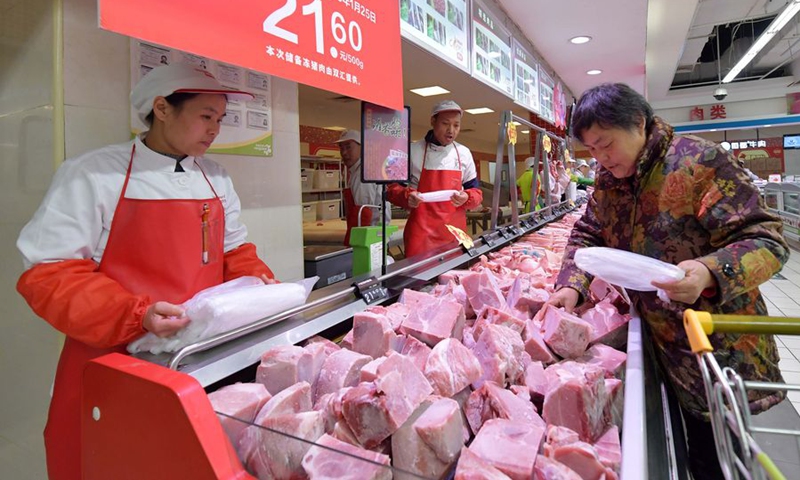Suspension of pork imports from Canadian plant not to impact domestic market
By Yin Yeping Source: Global Times Published: 2020/8/20 20:43:40

Customers purchase reserve pork in a supermarket in Nanchang, east China's Jiangxi Province, Dec. 22, 2019. (Xinhua/Peng Zhaozhi)
The suspension of imported pork from Canadian pork supplier Maple Leaf Foods will result in very limited impacts on the Chinese market as pork imports from Canada only represent a small proportion of the country's meat supply, said one industry insider.
The insider's remarks come after Maple Leaf Foods announced they will suspend pork exports to China following a recent coronavirus outbreak there, according to the company's statement on August 18.
"Maple Leaf Foods has temporarily suspended pork exports to China on a voluntary basis due to recent protocols adopted by the Chinese government for Canadian processors," said the statement.
The protocol requires any plant reporting a COVID-19 positive case suspend exports to China temporarily.
"We respect China's new import protocols for Canadian products and are working cooperatively with Canadian and Chinese authorities to resume exports quickly," said Michael McCain, president and CEO, in the statement.
China purchased around C$609 million ($462.7 million) of pork in 2019, making it Canada's third-largest pork market in terms of both value and volume, according to a Reuters report Wednesday, citing industry data.
Despite the suspension of pork exports, experts believe the impacts will be very limited on the Chinese pork market.
"Reducing Canadian imports will have little impact on China's meat market and prices," Gao Guan, deputy director of the China Meat Association (CMA), told the Global Times on Thursday, noting that Canada ranks below the top five pork importers in China, with Brazil, the US and Germany among the top five.
What's more, although the proportion of imported meat in all domestic consumer products has risen from 4-5 percent in 2016 to more than 10 percent as a result of African swine fever, about 90 percent of all meat products are still domestically produced, Gao said.
The shortage of pork supply in August is estimated to be further widened from 2.92 million pigs in July to 3.5 million in August, a report by industry information platform feedtrade.com.cn said on August 11, raising fears that the suspension of imports would hit a potential blow to the already-affected market.
However, Gao assured that will not be the case as the demand for pork can be very flexible with other food alternatives available.
"Even if all imported meat products were stopped, the Chinese market would not be particularly affected," said Gao.
In addition, China has made great efforts to increase meat supplies. Data released by the General Administration of Customs on July 14 showed that China imported 2.12 million tons of pork in the first half of the year, up 140 percent year-on-year, and beef imports approached 1 million tons, up 42.9 percent.
"China is also making efforts to increase meat production to meet any possible demand," Gao said.
Posted in: INDUSTRIES